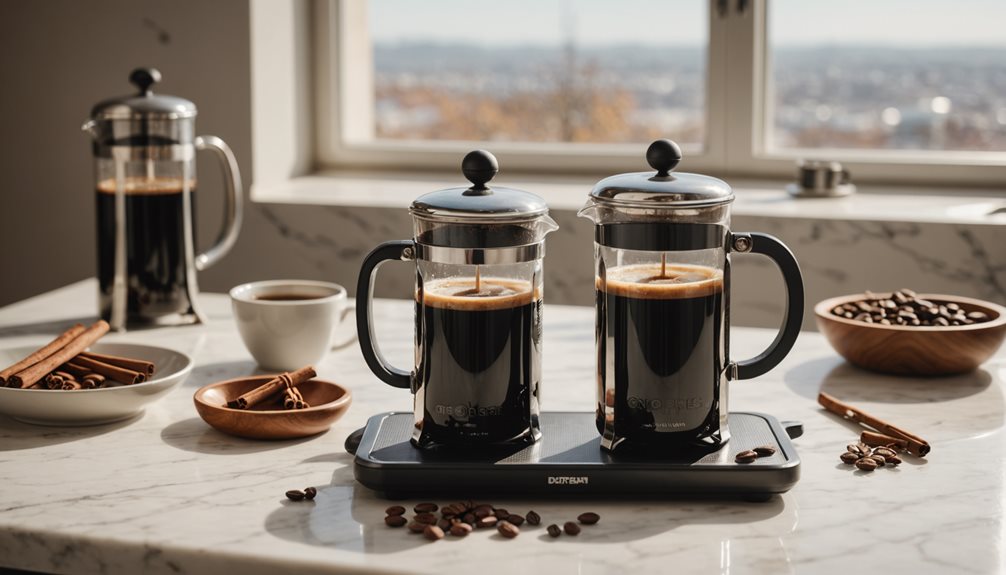If you’re practicing intermittent fasting, you’ve likely wondered whether your morning cup of coffee ruins your progress. You might worry that even a splash could break your fast, or that caffeine messes with your body’s benefits. The answer isn’t as simple as yes or no—it depends on what’s in your cup and your fasting goals. Before you reach for your brew tomorrow, there’s something crucial you need to consider.
Key Takeaways
- Black coffee is generally allowed during intermittent fasting as it contains minimal calories and does not break the fast.
- Adding milk, sugar, or cream to coffee raises its caloric content and may break a strict fast.
- Moderate consumption of black coffee may help control appetite and support fasting adherence.
- Caffeine in black coffee can increase metabolism and is compatible with most fasting protocols.
- Small additions like heavy cream or coconut oil may be acceptable for some but can impact stricter fasting goals.
Understanding How Coffee Interacts With Fasting

Coffee and Intermittent Fasting: Considerations and Effects
During intermittent fasting, the consumption of black coffee is generally considered acceptable, as it contains fewer than 3 calories per cup and negligible macronutrients. As such, black coffee is unlikely to disrupt the physiological processes associated with fasting. Consuming one or two cups of black coffee is unlikely to significantly impact the fasting state for most individuals.
However, adding ingredients such as milk, sugar, or flavored creamers can contribute additional calories and may influence the metabolic benefits of fasting. Even small amounts of cream, milk, or coconut oil should be used with caution, as these additions can quickly surpass the minimal caloric threshold that some fasting protocols observe.
Additionally, it’s important to consider caffeine sensitivity, as excessive consumption may cause adverse effects in some people, such as sleep disturbances or increased heart rate. Moderate coffee intake is generally advised to balance any potential benefits and risks.
Caloric Content and Its Role in Fasting Protocols
The caloric content of beverages can affect the outcome of intermittent fasting protocols.
Black coffee contains fewer than 3 calories per 8-ounce serving, making it a low-calorie option during fasting periods. Consuming black coffee in moderation is unlikely to cause significant metabolic changes or disrupt the fasting process.
However, adding ingredients such as milk, sugar, or cream increases the caloric content, which may break the fast and diminish some of the intended benefits.
Therefore, for those aiming to maintain the strict parameters of intermittent fasting, it’s advisable to consume only plain black coffee during fasting windows.
Potential Health Effects of Drinking Coffee While Fasting
Coffee contains minimal calories, and consuming black coffee during a fasting period is generally considered compatible with most fasting protocols.
Moderate intake—typically around one to two cups—does not produce significant metabolic changes likely to disrupt a fast. Caffeine in coffee may contribute to a modest increase in metabolic rate and fat oxidation, while coffee’s antioxidants may offer some general health benefits.
Additionally, caffeine can promote alertness and support cognitive function. Research indicates that black coffee doesn’t cause notable increases in blood glucose levels, making it suitable for individuals seeking to maintain the metabolic state associated with fasting.
Some evidence also suggests that coffee may help with appetite control, potentially aiding adherence to fasting regimens.
Acceptable Additions to Coffee During Fasting

Black coffee is generally compatible with most fasting protocols, as it contains minimal calories and doesn’t significantly affect insulin levels.
For those who prefer to add something to their coffee, a small amount—typically up to one teaspoon—of heavy cream or coconut oil is considered unlikely to have a major impact on the physiological benefits of fasting. These additions contain limited calories and are less likely to spike blood glucose or insulin when used sparingly.
In contrast, ingredients such as milk, sugar, and flavored syrups contribute a higher caloric and carbohydrate content, which can interrupt the fasting state and potentially affect metabolic outcomes.
For individuals seeking to maximize the potential benefits of fasting, consuming only black coffee is generally recommended.
Ultimately, the choice of what to add, if anything, should align with personal fasting goals and sensitivity to calorie intake.
Caffeine Intake and Its Impact on Your Fast
Caffeine Intake and Its Impact on Your Fast
Consuming caffeine during a fasting period can influence the fasting experience in several ways.
Black coffee, which typically contains about 100 mg of caffeine and negligible calories, doesn’t substantially affect fasting status or produce significant metabolic changes that would break a fast.
Some studies suggest that moderate caffeine consumption may help suppress appetite and support processes such as increased fat oxidation, which can align with the metabolic objectives of fasting.
However, excessive caffeine intake can lead to adverse effects, including anxiety and sleep disturbances.
It’s advisable to monitor individual responses to caffeine and adjust intake to maintain both the benefits of fasting and overall metabolic health.
Scientific Evidence on Coffee and Intermittent Fasting
Scientific evidence indicates that consuming black coffee—containing fewer than 3 calories per cup—during intermittent fasting is unlikely to significantly impact the physiological benefits of fasting.
Research shows that moderate intake, typically defined as 1 to 2 cups per fasting period, doesn’t appear to disrupt fasting-related metabolic processes and may help reduce feelings of hunger.
Both intermittent fasting and black coffee may promote mechanisms such as fat oxidation and autophagy; however, data directly assessing their combined effects are limited.
It’s important to avoid adding milk, sugar, or other caloric ingredients to coffee, as these additions can break a fast.